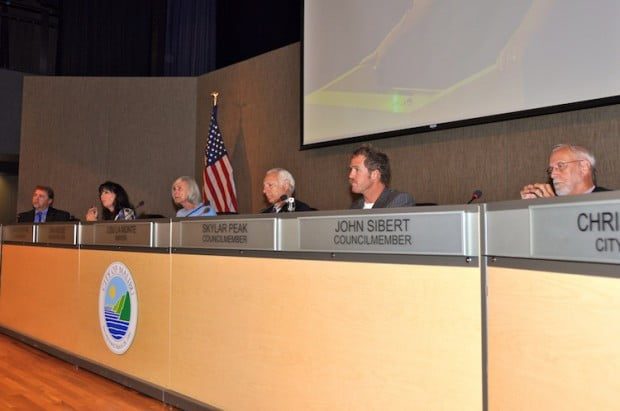
When City Councilwoman Laura Rosenthal proposed a formula retail ordinance last week on chain stores in the Civic Center, the idea seemed off-kilter to some who hoped for a broader proposal that would address problems at shopping centers such as Point Dume Village.
The recent movement pressuring the city to enact some sort of retail ordinance is largely rooted in community anger over the imminent closure of Point Pizza, after Point Dume Village landlord Zan Marquis and Point Pizza owner Hye Song Oh failed to agree upon a lease renewal.
The community group Preserve Malibu, helped organize several protests against the closure and believes Point Pizza exemplifies a larger problem for small business owners throughout Malibu.
“The ordinance really needs to extend to all of Malibu,” said Brian Eamer, a member of Preserve Malibu.
In a 3-2 vote, the council last week directed staff to draft an ordinance that would legally require chain store owners to obtain a conditional use permit from the city in order to open a franchise in any Civic Center shopping center that exceeds 10,000 square feet. Mayor Lou La Monte and Mayor Pro Tem Joan House cast dissenting votes.
Jefferson Wagner, a local surf shop owner and former mayor of Malibu, said an ordinance on the Civic Center would not address community concerns for Malibu as a whole.
“This isn’t anything for [preservationists],” he said. “This is a bandaid where you need a tourniquet.”
Rosenthal later defended the proposal’s reach, calling it a small step toward something that could become a broader ordinance later on. She said the Civic Center was her focus because it often attracts tourists and is Malibu’s version of a downtown.
“I think west Malibu and east Malibu [shopping centers] are more controlled and responsive to the residents, you don’t have any tourists there,” Rosenthal said in a telephone interview.
The councilwoman acknowledged having a vested interested in the Civic Center, serving as co-chair of an ad hoc committee that studies ways for the city to obtain and retire vacant, undeveloped commercial property in the Civic Center.
“[The ordinance and the committee] are all related in that we’re looking at commercial development,” Rosenthal said. “I think we’re all looking at different ways to help keep Malibu the small vibrant town that it is now.”
In a statement issued to The Malibu Times, Malibu Village owner Matt Khoury expressed his distaste at the idea of an ordinance.
“We do not believe that more restrictions and adding another layer to the permit process is a recipe for a healthy local economy,” Khoury said.
Jay Gilberg, a partner of Michael Koss who runs the Malibu Country Mart in the Civic Center, said he and Koss had no comment after the City Council’s decision.
Gilberg, however, addressed the council before their vote and said he and Koss opposed any type of ordinance.
“We … constantly strive to fill our vacancies with interesting, diverse tenants and services,” Gilberg told the council. “We do all of this without any government intervention or mandates.”
At least one member of Preserve Malibu, Diana Mullen, saw any step toward an ordinance as a positive.
“I’m just glad that they are finally addressing a very obvious situation because when you look at [the Civic Center], it’s mainly high-end retail…there just has to be a balance. That’s really all we ever wanted,” Mullen said.
Still, hope for a citywide ordinance remains, as does the question of what can be done to preserve the character of shopping centers elsewhere.
“The character of Malibu is really what’s in jeopardy and an ordinance protecting and ensuring retail diversity and choices of shopping … should cover all of the city,” Eamer said.
City Attorney Christi Hogin said the ordinance applicable solely to the Civic Center seemed theoretically possible given Malibu’s zoning code. The Civic Center has a code designation differing from shopping centers in the east and west.
“The Civic Center is our commercial general area and the other areas in the west end are designated for commercial neighborhood serving,” Hogin said.
City staff plans on holding a town hall meeting sometime in December to gather community input on the drafted ordinance, according to Associate Planner Joseph Smith.
